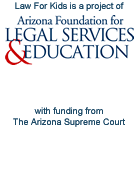 |
Speak Up! - View Question #25014 |
 printer friendly version printer friendly version
Question: What is the difference between an adjudication in juvenile court and a conviction in adult court. If a juvenile was adjudicated for an offense do they have to check that they have been convicted of a crime on a job application?
Answer: The difference between an adjudication in juvenile court and a conviction in an adult court starts with the different definitions and purposes of juvenile and adult court. Generally, juveniles who act unlawfully do not have the same consequences as an adult. However, there are excepts as explained below. This answer follows Arizona law.
First, look at the legal definitions of juvenile and adults in Arizona. A child, youth, or juvenile means a person who is under the age of eighteen years A.R.S. § 8-201(6). An adult is a person who is eighteen years old or older, according to this same law. A.R.S. § 8-201(3).
Then look at the purposes of juvenile and adult courts. Adult court punishes people for their unlawful conduct. A.R.S. § 13-101. Juveniles, on the other hand, are still under the care and control of a parent or custodian. A.R.S. § 8-201. The emphasis in juvenile court is on rehabilitation of a child’s unlawful conduct. Juvenile courts handle most juvenile unlawful conduct. For some serious or violent conduct, juveniles are transferred to adult court where the child is treated as if they were an adult. A.R.S. § 13-501. In juvenile court, a child’s unlawful conduct is called a delinquent act. A.R.S. § 8-201. In adult court, juveniles face charges of a criminal offense under the same rules as adults. A.R.S. § 8-201. A child found guilty in adult court is not delinquent, but, just like an adult, is convicted. A.R.S. § 8-201(10). Therefore, a juvenile who is convicted in adult court has a conviction on their criminal record. A juvenile in adult court is sentenced the same way an adult is except as provided in A.R.S. § 13-921. That law states if a child in adult court is placed on probation, the child is under adult probation supervision, but can use the services available under juvenile probation supervision.
On the other hand, a child adjudicated in juvenile court is not convicted of a crime, does not have the civil disabilities usually imposed because of a conviction,and is not disqualified for civil service, EXCEPT as provided in A.R.S. §§ 13-904(H); 13-2921.01; 17-340; 28-3304; 28-3306; and 28-3320. A.R.S. § 8-201(3). These exceptions involve the suspension of gun rights under certainconditions, (A.R.S. § 13-904(H)); the conduct of aggravated harassment, (A.R.S. § 13-2921.0); the revocation, suspension and denial of a license to take or possess wildlife, (A.R.S. § 17-340); driver’s license revocation or suspension and attendance of traffic survival school. (A.R.S. § 28-3304; A.R.S. § 28-3306)
Therefore, only juvenile adjudications that involve one or more of the above exceptions under the laws or a finding of guilt in adult court are considered convictions. On a job application, a juvenile does not have a conviction unless the juvenile’s unlawful behavior meets one of the above exceptions or the juvenile was convicted in adult court.
|


















